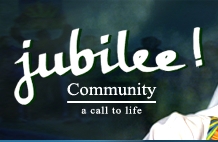ASHEVILLE, NORTH CAROLINA –At the beginning of this month, when the darkness and cold of winter seemed to be at their darkest and coldest, a group visited a shrine to the goddess Brigid, clearing away blockages to a spring and making offerings of flowers and milk. While that isn’t particularly remarkably in the Pagan community — many northern hemisphere practices include devotional acts at midwinter — it’s a bit more unusual when the practitioners are Christian.
 Members of the Jubilee! Community Church take “interfaith” to a level that is not commonly seen within an Abrahamic faith. Rather than seeking to understand basic tenets of other religions, they incorporate practices that are seen to tie into their interpretation of Christian faith, including celebrations of quarter and cross-quarter days. The church is based on a concept called Creation Spirituality, and led by Howard Hanger, a former Methodist minister who has turned a few heads, and attracted a fair number of congregants with his theology.
Members of the Jubilee! Community Church take “interfaith” to a level that is not commonly seen within an Abrahamic faith. Rather than seeking to understand basic tenets of other religions, they incorporate practices that are seen to tie into their interpretation of Christian faith, including celebrations of quarter and cross-quarter days. The church is based on a concept called Creation Spirituality, and led by Howard Hanger, a former Methodist minister who has turned a few heads, and attracted a fair number of congregants with his theology.
“When we first got started, we were definitely suspect,” Hanger said, and considered a cult by some. “There was a street preacher outside saying that we were sending people to hell.”
Now that the church is more established, “people mostly just leave [them] alone.” And, since they are no longer being actively condemned, they have joined Asheville’s vibrant interfaith community. “We find out commonalities with Baptists, Catholics, Jews . . . we all believe in making the world a better place, feeding the hungry, housing the homeless, all that sort of stuff. We’ve tried to connect with local Muslims.” he added, but without much success as yet.
Area Pagans, however, have been more than welcoming. “Pagans have been very wonderful,” Hanger said. “We’re pretty closely aligned with Pagan celebrations of nature, celebrating creation is our big banner, a big connection with the earth-worshipping community.”
Asheville Author and Village Witch Byron Ballard agreed with that assessment. “Jubilee began here as a funky Sunday evening service at one of the largest Methodist churches in town. They borrow from all sorts of places,” she said, and the children’s educational program “goes to a lot of sources for inspiration.”
Even with all of this “borrowing,” there have been no accusations of cultural appropriation. Ballard noted, “Pagans don’t own the agricultural year, and I certainly wouldn’t go to the stake over the Wheel of the Year.” Rather, she said, “it feels interfaith rather than appropriative, as [the church’s Nurture Coordinator, Vicki Garlock] gives plenty of credit and doesn’t try to pretend it’s an old Christian concept. [She] often attends Mother Grove events, and I have spoken in her classes several times.”
Garlock wrote this about the program:
Some may wonder why a Christian congregation would focus so much attention on Pagan resources, so let me share our educational perspective. We’ve developed a Bible-based, interfaith curriculum that we use with kids from preschool through 8th grade. They learn the basic Bible stories and then use these themes and narratives to connect with other faith traditions. For example, when they learn about Jesus praying in the Garden of Gethsemane, they also learn about prayer mats, prayer flags, prayer wheels, and prayer beads. We want the kids in our program to be grounded in our Judeo-Christian culture, but we also want to provide them with the tools they need to follow their own faith path.
In addition, we actively foster relationship with the Earth. We want youngsters to find the sacred in nature, to understand their connection to the environment, and to celebrate all of creation. These values are found throughout the world’s faith traditions, and many religious holidays coincide with seasonal changes. Kids understand seasons. They feel the changes in temperature, see the changes in plants, and associate certain events with certain seasons. Pagan wheel-of-the-year festivals offer us another opportunity to highlight the shared principles that all faith practices glean from the Earth’s wisdom.
In short, Jubilee’s philosophy, while grounded in Christianity, honors the similarities among traditions. Its credo encourages children to “follow their own faith path,” recognizing the divine in everything. A spiritual journey that begins at the Jubilee! Community Church could well take many directions. As Hanger pointed out, “We don’t worship Jesus. He never wanted that. We follow him. He was into that.”
The Wild Hunt is not responsible for links to external content.
To join a conversation on this post:
Visit our The Wild Hunt subreddit! Point your favorite browser to https://www.reddit.com/r/The_Wild_Hunt_News/, then click “JOIN”. Make sure to click the bell, too, to be notified of new articles posted to our subreddit.
At last, a place for ChristoPagans to go and not be hassled by Christians nor Pagans.
“We don’t worship Jesus. He never wanted that. We follow him. He was into that.”
Yes! They get it! Actually, I wouldn’t mind meeting this group. They sound like their hearts and souls are in the right place, and fit the sort of idea I have of good interfaith folks/practice.
Thanks for bringing them to our attention.